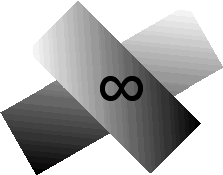| Tuesday, December 9, 2003 |
| Infinite valued logic |
One could say that there are several different kinds of logic, which are differentiated by the number of possibilities one is considering at any one time.
 You know, of course, two-valued logic. That is black and white thinking. It is when one considers that there are only two options, and one needs to choose between them. You're either for or against. You either support freedom, or you're a terrorist. You're either a christian or a heathen. You're either for or against abortion. A person who uses two-valued logic does merely need to decide whether to pick the 'good' option or the 'bad' option, and the only other thinking involved is to try to match the options with previously known 'good' or 'bad' labels. "Aha, he uses bad words, so what he's saying is of course bad". You know, of course, two-valued logic. That is black and white thinking. It is when one considers that there are only two options, and one needs to choose between them. You're either for or against. You either support freedom, or you're a terrorist. You're either a christian or a heathen. You're either for or against abortion. A person who uses two-valued logic does merely need to decide whether to pick the 'good' option or the 'bad' option, and the only other thinking involved is to try to match the options with previously known 'good' or 'bad' labels. "Aha, he uses bad words, so what he's saying is of course bad".
 There can also be three-valued logic. That's when there is Yes, No and Maybe. That is, the answer is either a clear Yes (good), a clear No (bad), or we just don't have enough information to decide yet, which is a Maybe. That can of course be considered a little more advanced than two-valued logic, as everything doesn't just get categorized at first glance. But not much better. There can also be three-valued logic. That's when there is Yes, No and Maybe. That is, the answer is either a clear Yes (good), a clear No (bad), or we just don't have enough information to decide yet, which is a Maybe. That can of course be considered a little more advanced than two-valued logic, as everything doesn't just get categorized at first glance. But not much better.
 More simple than either of those is one-valued logic. That is when there's not even any need for or faculty for evaluating things. Things are just the way they are, usually because The Big Book says so, or The Big Guru, or The Big Government. And if they didn't mention it, it of course doesn't exist. Generally it is if you consider yourself so powerless that you just have to accept whatever comes along, from the only direction you're looking in. Like, if you've latched on to a literal interpretation of some kind of religion, and you believe that the decision making process is entirely out of your hands. Oh, nothing wrong in believing in bigger things, but here we're talking about whether you think or not. More simple than either of those is one-valued logic. That is when there's not even any need for or faculty for evaluating things. Things are just the way they are, usually because The Big Book says so, or The Big Guru, or The Big Government. And if they didn't mention it, it of course doesn't exist. Generally it is if you consider yourself so powerless that you just have to accept whatever comes along, from the only direction you're looking in. Like, if you've latched on to a literal interpretation of some kind of religion, and you believe that the decision making process is entirely out of your hands. Oh, nothing wrong in believing in bigger things, but here we're talking about whether you think or not.
If you predominantly use any of those three approaches in your life, you're somewhat less than sane. Or, more kindly, you are likely to make decisions that don't work very well for you, and you might not be able to figure out why.  Another, undeniably more effective, kind of thinking is what we can call infinite valued logic. Essentially that means that any situation, any problem, consists of many different factors. And each of those factors might be pegged on a scale with an infinite number of gradations, in relation to some particular measure or outcome. And to make a good decision, you'd need to relate and weight all these factors together. Another, undeniably more effective, kind of thinking is what we can call infinite valued logic. Essentially that means that any situation, any problem, consists of many different factors. And each of those factors might be pegged on a scale with an infinite number of gradations, in relation to some particular measure or outcome. And to make a good decision, you'd need to relate and weight all these factors together.
Infinite valued logic will maybe appear less slick and convenient and forceful at first. Essentially it implies that the answer is "It depends" until you've examined all the factors involved. Including who do they apply to, and what are the exact circumstances. Is smoking bad for me? Is extra-marital sex wrong? What is the Republican Party good for? Should I become a buddhist? Should I eat less cheese? If you had the answer ready for any of those, without having to think about it, chances are you didn't really examine the factors involved in the questions, and you probably didn't look at how these questions related to me and my particular circumstances. Take smoking. There are certain negative health influences. And there are certain positive things smoking might do for a person. Both of those are different for different people. What exactly are they, specifically for this person? And how much smoking are we talking about? A cigar every evening, or 3 packs of unfiltered cigarettes per day? And who are we talking about? A soldier in war who's being shot at every day, or an accountant sitting by a desk? What would he replace smoking with if he didn't have that? And what else does that person consume on a daily basis? Is he happy about it or not? All of those are factors that have a whole range of possible answers. Some of them will support the person's decision to smoke, and some represent reasons not to. You'd have to add all of it up to make the most rational decision. You could do that very mechanically. Write down all the factors involved and peg each one on a scale between 0 and 10, or between -10 and +10, in relation to a particular outcome. And then you add the numbers up and see what you get. However, it doesn't at all have to be done that way. It doesn't even have to be done terribly explicitly. Good decision makers naturally do this internally. They are conscious of most of the factors involved, they rule out their own preconceived biases, they pay attention to the exact circumstances, and they might come up with an answer that just seems or feels or sounds right, without necessarily having articulated exactly why. In brief, it is about avoiding categorizing things in advance. Avoiding making decisions based on abstract generalizations one carries around. It is about noticing what is actually going on right here and now, what the actual components and influences are, and responding rationally to what is in front of you. For more on infinite-valued logic, check out Alfred Korzybski's General Semantics. See, for example, here, here, or here [ Patterns | 2003-12-09 10:18 | 11 comments | PermaLink ] More > |
| Moi non plus |
 I just had a chat, half in French, with Roland. And then he says "Moi non plus". And, hey, since I'm learning French, and the web is such an exquisite philosophical time waster, it leads me off on the 1/2 hour wild goose chase of clearing up what that really meant in that song, you know. The steamy "Je t'aime (moi non plus)" with Serge Gainsbourg & Jane Birkin. Which was sort of interesting, so I might as well relate it here. I just had a chat, half in French, with Roland. And then he says "Moi non plus". And, hey, since I'm learning French, and the web is such an exquisite philosophical time waster, it leads me off on the 1/2 hour wild goose chase of clearing up what that really meant in that song, you know. The steamy "Je t'aime (moi non plus)" with Serge Gainsbourg & Jane Birkin. Which was sort of interesting, so I might as well relate it here."Je t'aime..and so forth. Oooh, I'm blushing. (Well, not really). A full translation is below, even though it isn't a perfect one. And, indeed, the title is somewhat non-sensical. It means "I love you. Neither do I." or "Nor do I". Which isn't entirely correct. It is poetic license. And we'll have to hear from Serge Gainsbourg what he really meant by that: "I love women as an object, the beautiful women, the mannequins, the models. This is the inner painter in me. I never tell them I love them. Je t'aime... moi non plus (I love you... me neither) expresses erotism overcoming sentimentalism… So many songs about romantic and sentimental love, encounters, discoveries, jealousy, illusions, desillusions, betrayals, remorses, hatred, etc... Then why not devote a song to a sort of love much more current these days: physical love? "Je t'aime" isn't an obscene song, it's very reasonable to me, and fills this gap. Its explanation is that girls say "I love you" during sex, and the man with their ridiculous virility doesn't believe them. They think the girls only say it as a result of enjoyment, of pleasure. I guess I believe the girls, or maybe that's a result of my fear. But that's also an aesthetic step, a search of absoluteness"Leave it to the French to know how to weave together outrageousness, philosophy, eroticism and poetry. I think I get it. Moi non plus. [ Culture | 2003-12-09 16:58 | 11 comments | PermaLink ] More > |